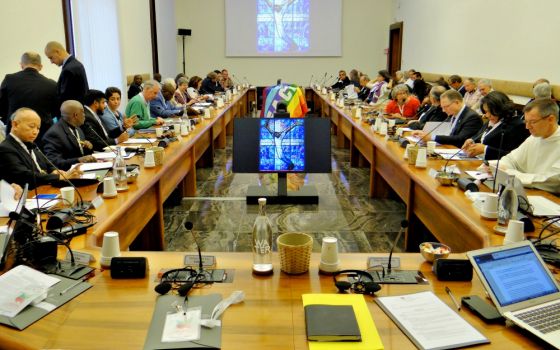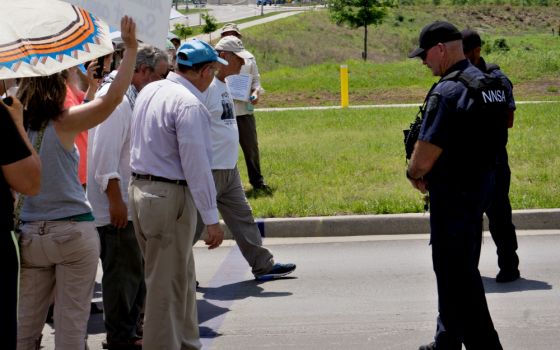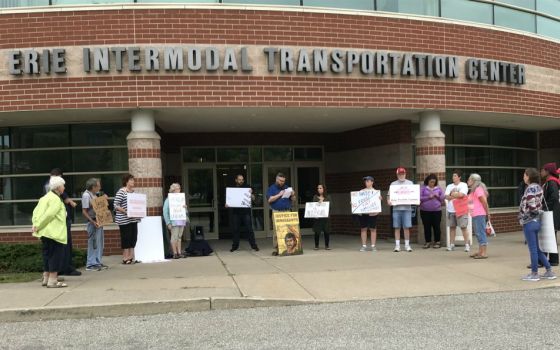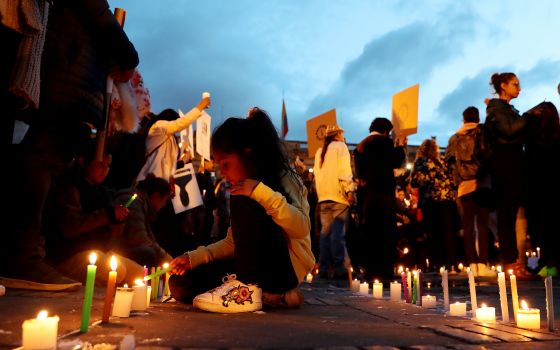
A screen in a plaza outside the Cartagena Indias Convention Center shows Colombian President Juan Manuel Santos as he signs a peace accord with FARC in Cartagena, Colombia, Sept. 26, 2016. (Wikimedia Commons/U.S. State Department photo)
The revised peace accord seeking to end Colombia's 52-year civil war comes at a price: High-ranking commanders could escape prosecution for war crimes, including the military's killing of thousands of civilians to falsely boost body counts.
The original pact between the government and the country's largest guerrilla group, FARC, the Spanish acronym for the Revolutionary Armed Forces of Colombia, was unexpectedly and narrowly defeated by voters in October, in a low-turnout referendum just two days after a major Category 5 hurricane struck the country.
Fearing the cease-fire could collapse, Colombian President Juan Manuel Santos immediately restarted talks with FARC, crafting some 50 changes in the accord, partly to appease the right wing that wanted harsher terms for the guerrillas. The revised accord included tougher accountability language, prohibited foreign magistrates from participating in judging crimes by either side, and required FARC to forfeit assets to compensate victims.
Santos sidestepped another referendum and sent the accord directly to Congress, which readily ratified it, as did Colombia's Constitutional Court, which authorized the legislation to be "fast-tracked" in order to quickly demobilize FARC.
But just hours before signing the revised 310-page pact on Nov. 24, Santos deleted a key paragraph about command responsibility at the request of army commanders.
The deletion gave "an effective guarantee of impunity for army officers" whose troops committed human rights crimes, according to Daniel Wilkinson, managing director of the Americas division at Human Rights Watch. In a Dec. 15 Financial Times blog, he wrote that the deleted paragraph had already been approved by FARC negotiators who hadn't sought such concessions for their own commanders.
The deletion affects Colombian prosecutors' ongoing investigations of more than a dozen army generals in the "false positives" scandal in which the military is accused of inflating body counts during the period 2002 to 2008 by murdering civilians and claiming they were guerrillas.
U.N. special rapporteur Philip Alston, who investigated the extrajudicial executions in Colombia in 2009, described the operation: "The victim is lured under false pretenses by a 'recruiter' to a remote location. There, the individual is killed soon after arrival by members of the military. The scene is then manipulated to make it appear as if the individual was legitimately killed in combat. The victim is commonly photographed wearing a guerrilla uniform, and holding a gun or grenade." Some wore "clean jungle boots which are four sizes too big for them."
The killers were rewarded with bonuses up to $1,000 per body, additional vacation time, and trips abroad, according to a 2015 Human Rights Watch report that called the routine "false positive" executions of civilians by army brigades under pressure from superiors "one of the worst episodes of mass atrocity in the Western Hemisphere in recent decades."
Human Rights Watch recently obtained the sworn testimonies of six generals in connection with the Colombia investigations, and reported on Dec. 20 that the six have implicated retired army Gen. Mario Montoya Uribe in some 44 cases of false-positive killings.
Montoya was the former head of the Colombian army, heavily financed and trained by the United States. The extrajudicial executions peaked during his three-year tenure. He is not only a 1983 graduate of the U.S. Army's School of the Americas (SOA), but was an instructor at the school in 1993 when it first came under fire in Congress for training Latin American officers implicated in torture, assassinations and overthrowing democratic governments.
Montoya is among at least 14 generals under investigation in the false-positive murders, along with the current head of the army, Gen. Juan Pablo Rodríguez Barragán, and another former head of the army, Gen. Jaime Lasprilla Villamizar.
Lasprilla Villamizar is under investigation for 48 false-positive killings and was an instructor from 2002 to 2003 at SOA's successor, the Western Hemisphere Institute for Security Cooperation (WHINSEC).
Rodríguez Barragán, Colombia's top military official, is under investigation for 28 false-positive killings, and is a 2001 graduate of WHINSEC's yearlong Command and General Staff Officer Course.
It appears, according to Human Rights Watch, that Montoya and the other generals under investigation may evade prosecution under the terms of the peace accord. The paragraph Santos deleted removed the definition of command responsibility embedded in international law that says commanders whose troops commit crimes may be held criminally liable even if they were not directly involved, but knew or should have known about them and did not intervene.
Santos, who recently received the Nobel Peace Prize for his efforts to end the war, apparently deleted the key paragraph at the request of army commanders to salvage his peace accord and put an end to the longest civil war in Latin American history. The civil war has claimed more than 250,000 lives and displaced nearly 7 million people.
The fiercest opponent of the accord was Álvaro Uribe, the country's former president whose government launched a scorched-earth campaign against FARC. He charged that the accord went soft on FARC and rewarded those who were involved in drug dealing and kidnappings. His right-wing, fear-based campaign also portrayed the peace accord as threatening family values because it recognized the rights of gays and lesbians.
It was during Uribe's presidency, from 2002 to 2010, that the military conducted its six-year campaign of killing civilians to boost body counts.
Amnesty International has praised the efforts to end the 52-year war, calling it "an achievement that cannot and should not be underestimated." But it also criticized the fact that "the sanctions will not reflect the gravity of some of the crimes committed and also that the definition of command responsibility could allow superiors of both the security forces and the FARC to evade responsibility for the actions of their subordinates."
When signing the accords Nov. 24, Santos said optimistically that in 150 days "all of the FARC's weapons will be in the hands of the United Nations."
The plan calls for FARC to disarm and demobilize in some 20 or so areas, but the government has yet to set up many of the demobilization camps and the demobilization deadline has been extended.
Human rights groups fear that the delays are putting the lives of FARC members, as well as others, in danger, as armed groups are now trying to take control of lands once dominated by the guerrillas. Since the cease-fire, local leaders of campesino and human rights groups have been assassinated.
The fears are not unwarranted. During peace negotiations in the late 1980s, right-wing militias, drug lords and members of the armed forces assassinated thousands of members of the Patriotic Union, a political party co-founded by FARC.
[Linda Cooper and James Hodge are the authors of Disturbing the Peace: The Story of Father Roy Bourgeois and the Movement to Close the School of the Americas.]



